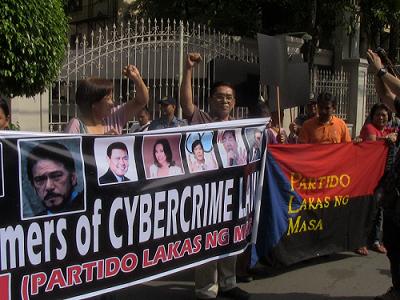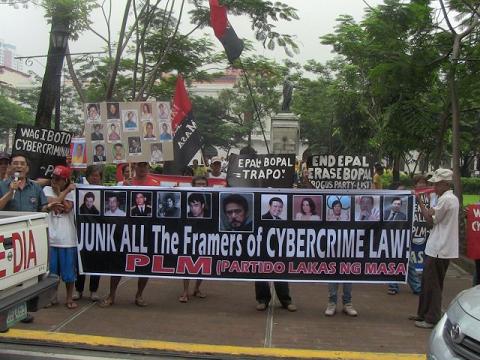From the Open-Publishing Calendar
From the Open-Publishing Newswire
Indybay Feature
On Philippine Cybercrime Act of 2012
Technological developments, nay, social progress must lead to increased democratization and not to more curtailment of freedoms. The advent of the Internet and related technologies has opened a wide and free access to democratic space wherein ordinary citizens, including the oppressed workers and, in general, the laboring and propertyless masses, could participate in studying and gathering information and discussing social and political issues.

The Internet has evolved into such a powerful democratic tool that upheavals in other parts of the world were aided by the use of this cheap technology to organize netizens and gather them for collective action against oppressive governments. Such was the case in the Middle East and North Africa which saw the downfall of despotic regimes, in Europe where thousands upon thousands took to the streets against the austerity measures and in the United States where the Occupy Wall St. movement was launched against the world’s richest capitalists, or the global 1%. The graffiti “Thank you Facebook” painted on several of Tunisia’s walls during the Arab Spring sums up this modern phenomenon.
The Cybercrime Prevention Act of 2012 represents for the Philippines a backward step in this development. The law is replete with repressive provisions that violate democratic rights enshrined in the 1987 Constitution. It legitimizes government censorship through Sec. 19, which authorizes the Department of Justice to issue an order to restrict or block access to any content. It institutes in Sec. 12 a regime of surveillance of all system users by authorizing law enforcers to collect or record traffic data in real-time associated with specified communications. It curtails free speech with its libel provision (Sec. 4) and treatment of Internet use as an aggravating circumstance that increases penalties for crimes defined under the Revised Penal Code (Sec. 6).
With the Cybercrime Prevention Act, the Philippine government has caught on to the global trend of denying mass and social movements access to effective means for articulating their demands. Based on several studies published by the OpenNet Initiative, starting the year 2000, governments across the world realized the threat to the power structure posed by the Internet where the freest of speech is expressed. Hence, governments adopted filtering, censorship and surveillance practices in order to restrict, block or control access.
These studies show that filtering practices and policies vary widely among countries, the most notorious of which is the “Great Firewall of China”. Blocked content spans a wide range of social and political topics and governments justify their filtering by referring to one content category, such as pornography, while other content categories were also being blocked. OpenNet Initiative noted “the tendency toward ‘mission creep’ --- that is, once filtering systems were adopted for whatever reason, state authorities would be tempted to employ them to deal with other vexing public policy issues.” In the meantime, state authorities harness the Internet in a way that promotes government-friendly content.
In the Philippines, where official statistics of Filipino families that have experienced hunger rose to 21 percent or about 4.3 million in the past three months; where, according to the Commission on Audit, over 100 billion pesos were lost to corruption under Pnoy’s Daang Matuwid; where elite governance and Trapo politics dominate; where the workers and the poor masses face the constant threat of starvation, high prices of basic commodities and services, termination from jobs and demolition, the Internet provides yet another powerful venue to criticize anti-worker/, anti-poor policies, articulate progressive demands, and subject government to public scrutiny and accountability.
The Internet represents an increasingly contested space where the Philippine State seeks to close all avenues of popular challenge to elite rule and governance. It is a domain wherein conflicts between the elite who are the rulers and the majority who are ruled take place. We must not yield a single inch of our freedoms.
___________________________________________
PLM Picket at COMELEC Against Cybercrime Law
National political party calls for the junking of senators who voted for the Cybercrime Law
Partido Lakas ng Masa (PLM), a certified national political party of the marginalized sectors, takes up the campaign against Cybercrime Law by calling for the junking of senators who voted for the Cybercrime Law during the coming elections.
Around a hundred PLM members staged a rally in front of the Comelec building on October 5, the last day of filing for candidacy for those running in the 2013 elections.
PLM identified the fourteen senators who voted for the Cybercrime Law, namely: Senators Edgardo Angara, Jinggoy Estrada, Gringo Honasan, Ping Lacson, Lito Lapid, Loren Legarda, Koko Pimentel, Bong Revilla, Tito Sotto, Ralph Recto, Manny Villar, Pia Cayetano, Bongbong Marcos and Chiz Escudero. The last four senators however (Senators Angara, Cayetano, Marcos, and Escudero) have either passed an amendment against the online libel provision of the law or said they would work for the law’s revision.
Sonny Melencio, chairman of PLM, said, “We call for the junking of the Cybercrime Law and the junking of the senators, who voted for it, during the coming elections. We will however stop the Junk campaign if the senators involved are ready to reverse their position, or amend the harsh, punitive, and anti-democratic provisions of law.”
“Out of fourteen senators, we will focus on ten senators who have not changed their support to the Cybercrime Law. This is not a blackmail, but a responsible response to the martial law character of the law. The Cybercrime Law imposes a chilling effect on the population, especially the youth and the Netizens in the country, who will be severely affected by so-called online libel and other issues,” Melencio stressed.
“The campaign will hit the grassroots community and factories nationwide where PLM has a base. Because of the severity of the issue, we want to hit the senators where it will hurt most—the votes,” Melencio ended.
http://www.masa.ph
The Cybercrime Prevention Act of 2012 represents for the Philippines a backward step in this development. The law is replete with repressive provisions that violate democratic rights enshrined in the 1987 Constitution. It legitimizes government censorship through Sec. 19, which authorizes the Department of Justice to issue an order to restrict or block access to any content. It institutes in Sec. 12 a regime of surveillance of all system users by authorizing law enforcers to collect or record traffic data in real-time associated with specified communications. It curtails free speech with its libel provision (Sec. 4) and treatment of Internet use as an aggravating circumstance that increases penalties for crimes defined under the Revised Penal Code (Sec. 6).
With the Cybercrime Prevention Act, the Philippine government has caught on to the global trend of denying mass and social movements access to effective means for articulating their demands. Based on several studies published by the OpenNet Initiative, starting the year 2000, governments across the world realized the threat to the power structure posed by the Internet where the freest of speech is expressed. Hence, governments adopted filtering, censorship and surveillance practices in order to restrict, block or control access.
These studies show that filtering practices and policies vary widely among countries, the most notorious of which is the “Great Firewall of China”. Blocked content spans a wide range of social and political topics and governments justify their filtering by referring to one content category, such as pornography, while other content categories were also being blocked. OpenNet Initiative noted “the tendency toward ‘mission creep’ --- that is, once filtering systems were adopted for whatever reason, state authorities would be tempted to employ them to deal with other vexing public policy issues.” In the meantime, state authorities harness the Internet in a way that promotes government-friendly content.
In the Philippines, where official statistics of Filipino families that have experienced hunger rose to 21 percent or about 4.3 million in the past three months; where, according to the Commission on Audit, over 100 billion pesos were lost to corruption under Pnoy’s Daang Matuwid; where elite governance and Trapo politics dominate; where the workers and the poor masses face the constant threat of starvation, high prices of basic commodities and services, termination from jobs and demolition, the Internet provides yet another powerful venue to criticize anti-worker/, anti-poor policies, articulate progressive demands, and subject government to public scrutiny and accountability.
The Internet represents an increasingly contested space where the Philippine State seeks to close all avenues of popular challenge to elite rule and governance. It is a domain wherein conflicts between the elite who are the rulers and the majority who are ruled take place. We must not yield a single inch of our freedoms.
___________________________________________
PLM Picket at COMELEC Against Cybercrime Law
National political party calls for the junking of senators who voted for the Cybercrime Law
Partido Lakas ng Masa (PLM), a certified national political party of the marginalized sectors, takes up the campaign against Cybercrime Law by calling for the junking of senators who voted for the Cybercrime Law during the coming elections.
Around a hundred PLM members staged a rally in front of the Comelec building on October 5, the last day of filing for candidacy for those running in the 2013 elections.
PLM identified the fourteen senators who voted for the Cybercrime Law, namely: Senators Edgardo Angara, Jinggoy Estrada, Gringo Honasan, Ping Lacson, Lito Lapid, Loren Legarda, Koko Pimentel, Bong Revilla, Tito Sotto, Ralph Recto, Manny Villar, Pia Cayetano, Bongbong Marcos and Chiz Escudero. The last four senators however (Senators Angara, Cayetano, Marcos, and Escudero) have either passed an amendment against the online libel provision of the law or said they would work for the law’s revision.
Sonny Melencio, chairman of PLM, said, “We call for the junking of the Cybercrime Law and the junking of the senators, who voted for it, during the coming elections. We will however stop the Junk campaign if the senators involved are ready to reverse their position, or amend the harsh, punitive, and anti-democratic provisions of law.”
“Out of fourteen senators, we will focus on ten senators who have not changed their support to the Cybercrime Law. This is not a blackmail, but a responsible response to the martial law character of the law. The Cybercrime Law imposes a chilling effect on the population, especially the youth and the Netizens in the country, who will be severely affected by so-called online libel and other issues,” Melencio stressed.
“The campaign will hit the grassroots community and factories nationwide where PLM has a base. Because of the severity of the issue, we want to hit the senators where it will hurt most—the votes,” Melencio ended.
http://www.masa.ph


Add Your Comments
We are 100% volunteer and depend on your participation to sustain our efforts!
Get Involved
If you'd like to help with maintaining or developing the website, contact us.
Publish
Publish your stories and upcoming events on Indybay.
Topics
More
Search Indybay's Archives
Advanced Search
►
▼
IMC Network


